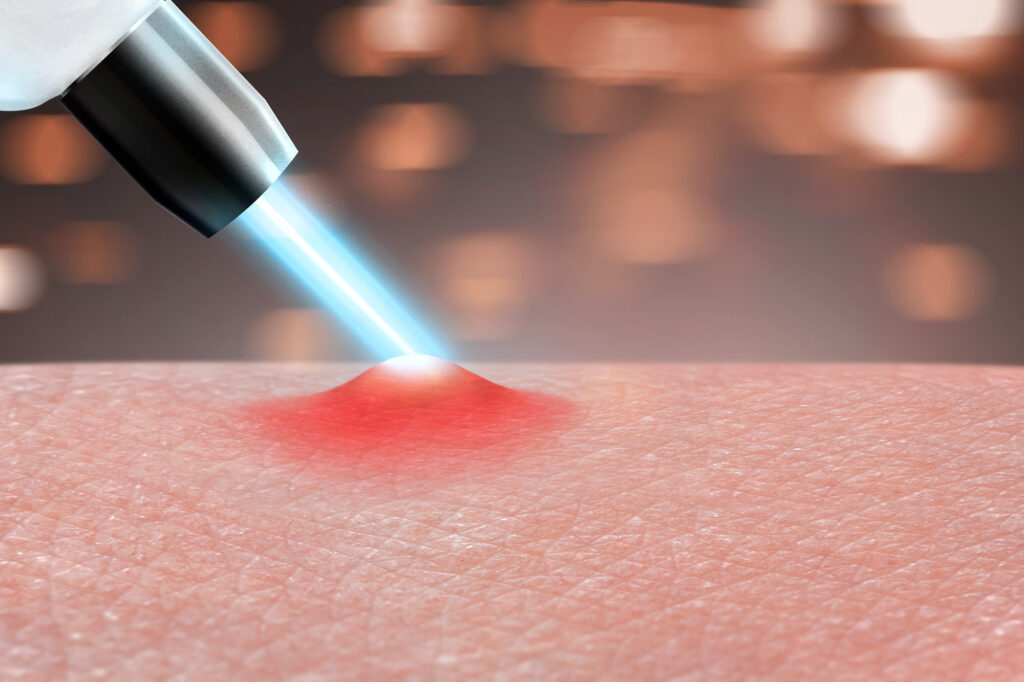The root cause of acne involves the glands and follicles around it. The glands release an oily substance called sebum, which is responsible for keeping the hair lubricated. When produced in excess, sebum clogs hair follicles, creating a conducive breeding environment for C. acnes bacteria. These bacteria are the cause of acne, and the skin damage triggers the body to produce collagen in an attempt to heal itself.
There are store-bought and home remedies that can help treat acne. These include topical creams and gels, facial cleansers, and light therapy devices. You can try laser treatment, like AviClear Acne Treatment, if none of the above options work.
- What Is Laser Acne Treatment?
Laser treatment is a non-invasive aesthetic procedure where the doctor uses skin manipulation to minimize scarring left behind by acne. Residual scarring is the primary concern for acne patients. The laser procedure will replace skin acne scar tissue and promote healthier skin growth. Although sometimes it may not erase all the scars, it will reduce them considerably and heal any pain you might feel in the wounds.
Even though laser treatment is effective, it’s not recommended for everyone. Anyone with an active breakout, wrinkles, or dark skin tones should not undergo the procedure. You’re prone to infections if you undergo the laser procedure with an active acne breakout.
- How Does Laser Acne Treatment Work?
Depending on the type of treatment, the laser may be used to remove or resurface the top layer of skin, or it may stimulate collagen production without removing any skin. A smoother skin layer becomes visible as the top layer peels away, making the spot appear clear. Alternatively, the laser heat and light allow new skin cell growth. The scar improves when the laser heat causes blood vessels in the area to constrict and minimizes inflammation.
The overall result is that the scars are no longer elevated or red. This is the beginning of new and healthier skin growth. Fractional lasers, non-ablative lasers, and ablative lasers are common for a particular scar severity.
Fractional lasers work by creating thousands of tiny micro-injuries in the skin, which stimulate the skin’s natural healing response. This leads to the production of new collagen and elastin, which can improve the appearance of scars, fine lines, and wrinkles and improve overall skin texture and tone.
Ablative laser resurfacing removes the top skin layer. The removal will leave you with some redness, which can take up to 10 days to several weeks to clear.
Non-ablative laser resurfacing penetrates the deep layers of the skin, stimulating collagen production and using heat to trigger new skin cell growth on scarred tissue. It doesn’t involve any skin removal.
- Is Laser Acne Treatment Safe?
Laser acne treatment is a safe and FDA-approved procedure to deal with acne. It’s a procedure that uses modern technology to treat deep skin tissues on a scar without interfering with the surrounding tissues. The laser equipment is tailored for cosmetic use and other proven medical procedures, making acne treatment safe.
The risk of complications with this procedure is relatively low, but it might cause temporary redness, swelling, and itching of the treated area. The number of treatments required and the expected outcomes will vary depending on the individual and the severity of their acne.
After each session, a patient may experience mild tingling sensations or slight warmth in the treatment area. In short, laser acne treatments are safe when completed by experienced practitioners with regulated and FDA-approved lasers.
- What Are The Side Effects Of Laser Acne Treatment?
Just like any other medical procedure, laser treatment has its fair share of side effects. The side effects are minimal, and some clear within a few hours.
The common side effects are redness and swelling of the treatment area. The pain may go away within two hours, while the redness may take up to 10 days or more. In a few cases, a patient may experience darkening, known as hyperpigmentation.
If you spot any pus or experience fever, consult your treatment provider because it could be an infection.
- How Should You Take Care Of Your Skin After Laser Acne Treatment?
You‘ll need to take extra care of your skin for months after the procedure. Ensure you apply sunscreen every time you’re outdoors. You should also avoid sun tanning and exposure to the sun for about two months or more. Your treatment provider may prescribe a moisturizer or toner. Maintain skin cleanliness around the area, and stay off your makeup routine for at least six days. You should start noticing results from the treatment after 10 days or more.

Conclusion
Acne can be unsettling and uncomfortable. If you’re struggling with acne, consult your dermatologist and discuss what laser procedure would suit you. That way, you can have smooth skin that boosts your confidence.
You should remember that laser treatment is not just for the face. The neck, torso, back, and arms can also undergo laser acne treatment. The treatment is safe and scientifically tested. You just have to ensure that a board-certified dermatologist performs the procedure.


